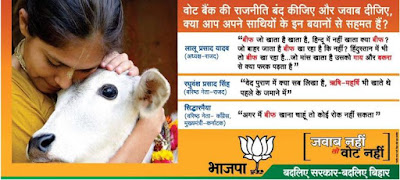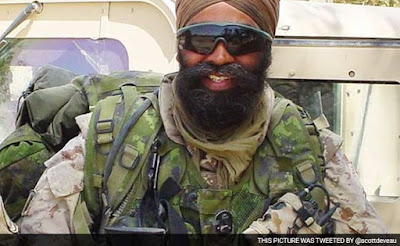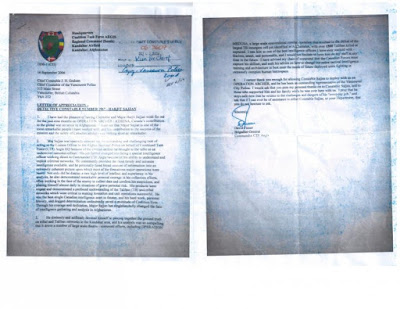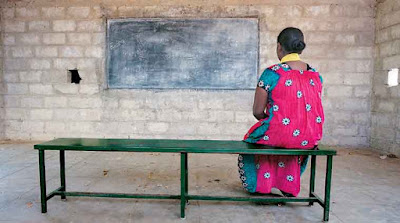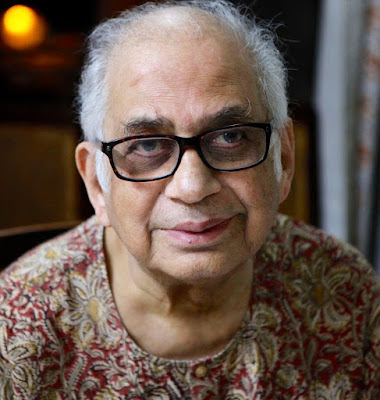Just get out and eavesdrop on a conversation at your local teashop or on a bus: you will know how anti-Muslim hysteria spreads.
POLITICS | Long-form | 07-11-2015
Rishi Majumder @RishiMajumder
Mr X: “You girls speak your mind. If this were a Muslim country this wouldn’t have been tolerated.”
Ms A: “Even those leaving Syria are going to Europe, not other Muslim nations.”
Ms B: “That’s true.”
Mr X: “They don’t want to educate their children.”
Ms A: “They only want to send them to madrassas.”
Ms B: “True.”
Mr X: “We Hindus have only one or two children. But Muslims keep having so many.”
What better to interrupt you from a reading of Chris Hedges’ Death of the Liberal Class on a train journey?
Here is a conversation you’ve probably heard before. If you follow the thread you’ll notice how an unsubstantiated set of beliefs and an apparent concern for women’s rights and education begins to teeter on Islamophobia.
The last month could easily be termed the “Month of the Indian Intolerance Debate”. Almost everyone has weighed in and they continue doing so. After the writers came artists and musicians, scientists, filmmakers, historians and other academics — some of India’s most eminent names. Awards have been returned, positions resigned, statements made. The RBI governor has spoken. So have two well-known entrepreneurs and philanthropists. The most recent voices have been an international research and ratings agency, one of India’s biggest film stars, a Booker-winning writer and another group of acclaimed filmmakers. Like those before, powerful voices that say, ‘Yes there is intolerance. Yes, it is increasing.’
This is being contested by some, including members of the central government and ruling party. Their standpoint, to put it simply, is: ‘Intolerance isn’t on the rise’.
But you needn’t listen to the country’s intellectual giants, industry leaders, icons or the government to resolve this. Just get out and eavesdrop on a conversation at your local teashop or a bus. Or, as in my case, a train compartment of people traveling from Jodhpur to Delhi.
I didn’t interview my co-travellers, nor ask them their names, but here are brief profiles gleaned:
Mr X is a heavy set man with silver hair. He wears a plain shirt, trousers and sandals. He appears to be in his late fifties or early sixties. He used to manufacture and trade in silver vessels but then that stopped being profitable so his new business is taking sick factories on contract from the government, breaking them up and selling parts for a profit. He lives in North West Delhi’s Model Town. He says he has always been a BJP voter, except for the 2013 Delhi elections when he voted AAP, got disappointed and then went back to voting for the BJP. He hails from Churu originally, the station from where he boarded. Back in Churu, many of his family members are either actually affiliated with the BJP or its voters. He is proud that his family has, in an incremental way, done away with following Rajasthan’s ghunghat tradition. “I told my wife she doesn’t have to wear the ghunghat,” he says. “And then I told my daughter-in-law she can wear jeans if she wishes to.”
This conversation began because Mr X and Ms B got into an argument about what Prime Minister Narendra Modi has done for the country.
Ms B, dressed in a salwaar kameez looks as if she is in her late twenties. She is a PhD student, studying in Rajasthan currently, but born and brought up in East Delhi’s Karkardooma. She argued that, though she had voted for Modi in 2014, he has hardly implemented any new policies, instead merely rebranded older ones. Mr X said that schemes like Swachch Bharat and the Jan Dhan Yojana would lead to a sea change in attitude upon which Ms B replied, “Maybe, but let them show results first.”
Ms A, another PhD student born and bred in Rajasthan wears a pair of jeans and a sweatshirt. She is researching the persecution of women for alleged witchcraft. She and Ms B are Jains. We know this because Mr X asked them their caste, then stated he was a “banya”. Ms A backed Mr X in his support for Modi and, with Ms B questioning their claims, the conversation may have delved deeper into their perception of governance but at some point Mr X said, “80 per cent of Indian Muslims don’t like Modi.”
No one asked Mr X where he obtained this random statistic. It seems to be something he has arrived at arbitrarily, upon noticing: “most of my Muslim friends aren’t Modi voters”. This was how the conversation turned to Muslims.
Now, let’s come to the crux of it. Here is what Mr X said at the end of the conversation: “Since Modi became Chief Minister in 2002, there have been no riots in Gujarat. This is because the Muslims wouldn’t dare to do anything after 2002. When you have a majority and a minority in the country, the majority must suppress the minority. Otherwise the minority will eat it up.”
He went from speculation to rhetoric. And the rhetoric isn’t new. “I warn the Hindus that the Mohameddans are likely to prove dangerous to our Hindu nation,” VD Savarkar had said while presiding over the 1937 session of the Hindu Mahasabha. “Let us not be stone blind to the fact that they as a community continue to cherish fanatical designs to establish a Muslim rule in India.” Also: “India cannot be assumed today to be a unitarian and homogenous nation, but on the contrary there are two nations in the main: the Hindus and the Moslems in India.”
What was new is embedded in what followed. Uncomfortable silences began to fill the conversation as the speakers noticed I wasn’t joining in. Finally, Mr X asked me, “Aap Mohameddan toh naheen hain naa (I hope you are not a Muslim)?”
“What if I were?” I asked.
“It makes no difference,” he said. “Nowadays I say all of this to my Mohameddan friends as well. I say: I know you hate Modi, but this is how things are, how things should be.”
“Nowadays”.
Those who claim intolerance is not on the rise today make two points mostly.
One, statistics.
“The number of incidents of communal violence hasn’t increased,” they say. As if intolerance can only be gauged by the number of communal clashes or killings. In fact, intolerance, like any other intangible noun can never really be calculated, only indicated. As stated many times over by those protesting its rise, it is a culture. As implied in the writings and speeches of Savarkar, it’s an ideology.
Read Savarkar on the establishment of the Indian nation state, for instance, and it will be difficult to pinpoint immediately where the intolerance lies.
“The Moslem minority in India will have the right to be treated as equal citizens, enjoying equal protection and civic rights in proportion to their population. The Hindu majority will not encroach on the legitimate rights of any non-Hindu minority… The Moslem minority in particular has not obliged the Hindus by remaining in minority and therefore, they must remain satisfied with the status they occupy and with the legitimate share of civic and political rights that is their proportionate due… The Hindus do not want a change of masters, are not going to struggle and fight and die only to replace an Edward by an Aurangzeb simply because the latter happens to be born within Indian borders, but they want henceforth to be masters themselves in their own house, in their own Land.”
To discover the intolerance in between these lines, read Dr BR Ambedkar’s critique of the above:
“It must be said that Mr Savarkar's attitude is illogical, if not queer… If he claims a national home for the Hindu nation, how can he refuse the claim of the Muslim nation for a national home?”
And,
“One can justify this attitude only if the two nations were to live as partners in friendly intercourse with mutual respect and accord. But that is not to be, because Mr Savarkar will not allow the Muslim nation to be co-equal in authority with the Hindu nation. He wants the Hindu nation to be the dominant nation and the Muslim nation to be the servient nation.”
Coming back to the present, Mr X’s intolerance seems to have “increased” only in terms of him now being comfortable in letting “Muslim friends” know that they are the “minority” which “must be suppressed”. And while sticks and stones may break your bones, words will never harm you.
But this isn’t always the case. Mohammad Akhlaq’s family in Dadri witnessed more than words on September 28. There, intolerance resulted in murder. Communalism culminated in criminality. Likewise, most likely, with the killing of Prof MM Kalburgi on August 30. Definitely so with the Gujarat riots in 2004 and the Babri riots of 1992. And, yes, with the anti-Sikh riots in 1984 as well.
These incidents have been the biggest blemishes on our nation’s recent past. To prevent more of the same, what indicators should we look for to determine whether intolerance is on the rise?
For starters, since we’re speaking of a “culture” of intolerance, let’s examine what the official mascot of Indian culture – our Culture Minister – has to say.
On Dadri, a complete dismissal: “This (incident) should be considered as an accident without giving any communal colour to it.”
On APJ Abdul Kalam, “Aurangzeb Road has been named after such a great man who, despite being a Muslim, was a nationalist and a humanist”.
On holy books: “I respect Bible and Quran but they are not central to soul of India in the way as Gita and Ramayana are. As India's cultural minister, I recommend that Ramayana and Gita should be part of our school curriculum and I am working extensively with HRD minister Smriti Irani towards this.”
What about the party ruling our nation currently? Here is a list of some of the outrageous things other members of the BJP said immediately after the Dadri episode.
Among them:
“Why responsibility to keep peace and maintain calm is always put on the Hindus alone? Be a victim and maintain silence in face of assaults!!!” —BJP MP Tarun Vijay.
“The police have arrested innocent people. We also demand legal action against those people, who are engaged in cow slaughter as it is hurting Hindu sentiments,” —BJP leader Vichitra Tomar.
More was to follow:
“Agar nirdoshon ke khilaaf karyawaahi ki gayee, to munh-tod jawaab humne pehle bhi diyaa hai aur abh bhi denaa jaante hain (If action is taken against ‘innocents’, we have given a befitting reply earlier and know how to do so again).” —BJP MLA Sangeet Som, who was an accused in the Muzaffarnagar riots, commenting on people being arrested after the lynching at Dadri.
Words which may not harm anyone directly, but which, coming from representatives of the party and the state, can easily be interpreted as signal for what goes.
It is for this reason that politicians from the BJP often recount Rajiv Gandhi’s reprehensible words – “When a big tree falls, the earth shakes” – in the aftermath of the Sikh riots.
Rajiv Gandhi is not with us today but how, pray, are the same speakers – who never tire of accusing opponents of “selective amnesia” – not appalled at similar statements by serving ministers, MPs and members from their own party?
There has been many an appeal, by now, for the prime minister to speak strongly and decisively on the issue. But, the question to ask is: Has he done so already?
Watch Rakesh Sharma’s Final Solution and you will come across a clip of an 2002 election speech by Modi after the Gujarat Riots, around 50 minutes into the film.
“Who are the culprits of Godhra? You tell me!” he says, in response to criticism of the riots that shook the nation after a train compartment was torched in Godhra. “If nothing had happened at Godhra, would anyone have hurled even one stone?”
During the 2014 Lok Sabha polls, Modi refrained from making any statements insinuating a Hindutva agenda. Yet, if you examine the speeches made by others at his rallies before he spoke, especially those in UP and Bihar, you will find them full of such references.
Now, read what Sharma said to the Times of India in a recent interview:
“I am a soldier of the Modi government. I cannot go beyond the Prime Minister's line of action. I only remark within my capacity and on those matters that are related to my ministries.”
Also: “From time to time, we receive directions from the party high command about commenting on political issues. I do not cross boundaries drawn by the high command.”
Do you still believe you don’t have the PM’s views on rising intolerance in the country?
Truth is, there was no need for many BJP party men who did so to make a statement after the killing at Dadri in the first place. The primary responsibility to react fell upon the state government, run by the Samajwadi Party. Similarly, the initial responsibility of reacting to the murder of Kalburgi fell upon the Congress government in Karnataka. Yet BJP politicos rushed to make themselves heard.
And now for the second flawed argument by those claiming there has been no increase in intolerance. At the centre of whataboutery surrounding the debate lies the question: What about the Sikh riots?
Here’s the thing. The Congress wants to shake off the ghost of 1984, but it can’t do so without successfully prosecuting the guilty who are alive.
Still, a question we need to ask is: Does the Congress conduct its campaigns on a majoritarian agenda that would make Sikhs uncomfortable today? Secondly, Manmohan Singh has been a Congress prime minister as well as prime ministerial candidate. Can we imagine the BJP, in the foreseeable future, having a Muslim as their prime ministerial candidate?
The BJP, rather, seems to want to wear the ghosts of 1992 and 2002 as badges of honour. The protection of Hindu cultural identity wasn’t a cornerstone for the foundation of the Congress party, but it was so for the Bharatiya Jan Sangh, the BJP’s predecessor. And while the BJP tried to be more inclusive in its early years as a new party, moderating its Hindutva stance and emphasizing its links to the socialism of the Janata Party instead, it has reverted to a clear majoritarian agenda since the Ram Janmabhoomi movement. Any hope for this agenda to be whittled down with the arrival of the Atal Bihari Vajpayee government was dashed with the Gujarat riots of 2002.
Hence, despite what the Union finance minister Arun Jaitley believes, Modi has not been a “victim” of “ideological intolerance” “since 2002”. He is more likely to have been either the victim — or merely an ambitious adopter — of an intolerant ideology.
No one underlines this better than the Prime Minister Modi’s prime confidante. BJP national president Amit Shah wrote his maiden blog on September 26, two days before the incident at Dadri. Here is a translated excerpt:
“If the leading political leaders in independent India had drawn from Savarkar's life and philosophy to build the nation, then the country would not be passing through such difficult times. Come and pledge with me that we will be partners in making an India of his dreams.”
Once again, read between the lines. Intolerance is rising, most definitely. But it’s also beginning to settle in.
Source:
dailyo
Blogger's Comment: An EXCELLENT MUST READ article!!





